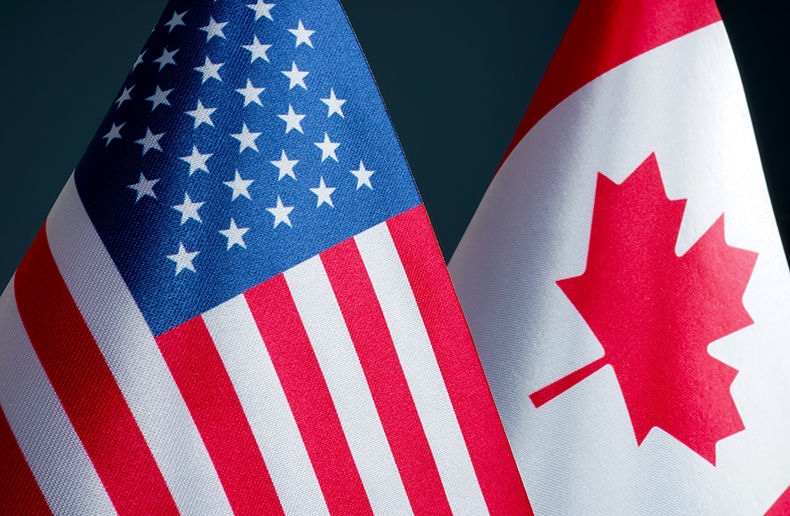
Tuesday, March 4, 2025, marked the entry into force of the tariffs decreed by U.S. President Donald Trump earlier this year, and it will undoubtedly have an impact on Canadian group insurance, according to several experts.
Gathered at the Palais des congrès de Montréal on Feb. 27 as part of the Group Conference held by the Insurance Journal Publishing Group, these experts took stock of the situation, while it was still unclear whether the U.S. Commander-in-Chief would finally carry out his threat.
“The first impact, which is already very tangible, is the uncertainty and concern that this noise is generating in our groups,” said Marie-France Amyot, Vice-President, Group Benefits and Retirement Savings at Desjardins Insurance, referring to the prevarication and anticipation related to tariffs in recent months.
Will medication be spared?

The cost of medication could be affected by the tariff war with our neighbors to the south, panelists suggested.
It's not crazy when you think that molecules, by the time they reach Quebec pharmacies, have crossed several borders,” said Amyot. “The raw materials come from Asia - from China or India - and [the drugs] are manufactured by pharmaceutical companies in Europe or the United States. So, when that happens here, the application of tariffs could initiate an inflationary spiral.”
Éric Trudel, Executive Vice President and Group Leader for Beneva, agrees. “According to our statistics, about 40% of the drugs consumed in Canada come from the United States. And about 30% of the drugs used by U.S. pharmaceutical companies come from outside the country. In principle, the U.S. has imposed a 10% tariff on what comes from Asia, so that raises the price by about 3%, plus the impact of exchange rates, because our dollar is not as good. So that alone could account for 5% inflation on drugs coming into Canada.” (Editor’s note: The U.S. government has now raised the tariffs on China to 20%).
This increase could be greater if Canada retaliates with its own tariffs, warned Trudel. “Should Canada decide to impose a 25% tariff on what comes in from the U.S., that would mean 40% of our drugs would absorb a 25% tariff, plus the 5% I just mentioned. We hope it won't go that far.”
Marie-France Amyot believes that “as insurers, the situation imposes a duty of rigour”.
“Drug costs are relatively predictable, but we have to make sure that controls are in place. We need to have good agreements with pharmaceutical companies and make sure we're giving the right molecule to the right patient under the right conditions, while being proactive in the face of other drugs coming onto the market.”
More expensive at the dentist?
Similarly, since much of the equipment used by dentists, orthodontists and dental surgeons is manufactured in Europe and the U.S., it's not out of the question that some of the increased costs associated with tariffs will be passed on to patients, and therefore to their insurers for those whose dental care is covered.
Historically, in Quebec, dental care costs rose in line with the Régie des rentes du Québec (RRQ) index,” explains Éric Trudel. “Now, as we can see, it's the pension index, plus another percentage.”
He gives the example of the Association des chirurgiens dentistes du Québec, which increased its rates by 4% last January, while the RRQ index was up by 2.6%.
“In Ontario, rates went up by 2%: it's as if they had returned to an increase similar to inflation,” notes Trudel. In Quebec, we seem to have a rate that's rising faster.”
Effects on disability insurance

The panelists did not seem to agree on the impact of the rates on disability insurance claims.
“In times of economic uncertainty, employees tend to stay in their jobs more, even if they experience increased stress and higher workloads, because their employer is carrying out lay offs,” observes Marie-France Amyot.
“We don't expect a change in the incidence of disability in the short term,” says Charles St-Laurent, Regional Vice-President, Business Development at Medavie Blue Cross.
“It's more in the medium term, if there's an economic slowdown, that we're going to see stress affecting employees and an impact on disability. It’s similar to when an employer announces layoffs in the next three months: keep an eye on disability claims, some people will try to take advantage of the situation to avoid being laid off. You know, that shoulder pain that's been going on for several months, maybe it's less tolerable now and that's when there'll be a disability claim.”
Éric Trudel disagrees. “Maybe that's what will happen in larger companies, but in SMEs, I think some people will tolerate shoulder pain because of the uncertainty, to avoid being among those who lose their jobs,” he said.
When tariffs come into effect, they will also lead to job cuts; at the same time, there will be fewer contributors to group insurance plans within organizations.
“There are still fixed costs which, with fewer premiums paid, will put pressure on the plan, not to mention the cost of drugs and other factors,” says Éric Trudel, who also stresses the importance of prevention.

Actuary Jean-Guy Gauthier, a consultant in insurance, risk management and employee benefits with his firm CQFD Actuariat, was the most optimistic of all the panelists.
In response to U.S. tariffs, Canadian companies will be rethinking their offerings, even if it means refocusing or, on the contrary, broadening them. “There will be employers recruiting and new market opportunities here,” he said.
This is an opportunity to be seized, especially since “benefits are sometimes worth more than salary in the eyes of employees,” he added. Having a good benefits program and promoting it will be important.”
And what about travel insurance?
Briefly touched upon, the impact of tariffs on travel insurance divided the panelists, who heard different sides of the issue.
“I had a meeting with my teams who say it's going to be horrendous, because our insurers are getting worse discounts outside the U.S.,” says Éric Trudel of Beneva.
These insurers will have to work to get better deals for travel outside North America, he maintains. Nevertheless, he suggests that the fact that a good number of Canadian tourists are opting to shun the U.S. in favor of Canada may have no short-term effect on the cost of travel insurance.
In fact, some airlines have revised their offering of flights to the U.S. because of an anticipated boycott,” says Gauthier.
Insurers to take the lead
In any case, according to Marie-France Amyot, it will once again be up to insurers to manage their operations well to minimize the impact of the tariff war on the bill passed on to plan sponsors. “That's what our groups expect from us: that we keep costs under control to ensure the sustainability of the plans,” she elaborates. “They need to see their insurer as a partner with whom to build a long-term relationship and explore solutions together.”
Charles St-Laurent also says that insurers must act as good partners to employers. As during the pandemic, when some clients were hard-hit, insurers showed a great deal of flexibility: extended coverage, extra time to pay premiums,” he says. A lot of accommodations were made to support employers. I think we're still in a situation where we have a role to play.”
Jean-Guy Gauthier agrees. “As an advisor, I think the most important thing at this point is to know our customer well: how will they be affected, what will their cost constraints be? They may ask me to aggressively renegotiate their renewal, or they may need to hear a positive message,” he explains.
“The first mentor I had in my career told me that the first thing an advisor should hate is stability,” he added, “because changes bring opportunities to show our customers how we help and support them.”
Related:







